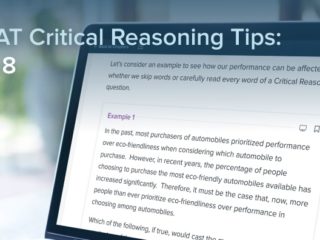| Getting your Trinity Audio player ready... |
Much of the work we do when preparing for GMAT Verbal Reasoning involves developing our conceptual knowledge. To do so, we spend time learning about the various Critical Reasoning and Reading Comprehension question types. However, mastering concepts is only half the battle if we want to earn a high Verbal score. The other half is applying those concepts to Verbal practice questions to efficiently find correct answers.
Without that essential practice, we’ll struggle to perform up to the level of our knowledge on test day. Yet many students spend ample time completing GMAT Verbal Reasoning practice questions but experience little or stalled improvement in performance.
When it comes to GMAT preparation, the amount of practice is less important than the quality of the practice. If we practice in ways that aren’t effective—or may even be counterproductive—we waste time and ingrain bad habits. These habits can hold us back on test day.
The amount of practice is really not as important as the quality of the practice.
Fortunately, with just a few simple strategies, you can make the most of your GMAT Verbal Reasoning practice. In doing so, you’ll put yourself in the best possible position to perform well on test day.
So, without further ado, let’s discuss my top 3 tips for GMAT Verbal practice. These practical tips will sharpen your skills and keep you progressing toward your score goal.
Here are the tips we’ll cover:
- Tip #1: Do Most of Your Practice Untimed
- Tip #2: Treat Every Answer Choice as a Question
- Tip #3: Use Logic, Not Gimmicks
- What Resources Are Available for GMAT Verbal Reasoning Practice?
- Key Takeaways
- What’s Next?
Let’s get into our tips!
Tip #1: Do Most of Your Practice Untimed
Whenever a GMAT student contacts me wondering why he or she isn’t seeing a Verbal score improvement, one of my first questions is always, “How much time do you typically spend on each practice question?” If the student has been answering practice questions in under 2 minutes each, then we’ve found the culprit.
It seems counterintuitive, but the most effective way to learn to answer GMAT Verbal questions at test pace is to not answer them at test pace. Many people have the impression that the opposite is true. However, answering questions at test pace from the outset of your practice doesn’t allow you time to develop your skills.
Only after you’ve developed skill in carefully analyzing questions, noticing key details, and using precise logic to identify correct answers will you be able to implement those skills quickly and consistently.
The most effective way to learn to answer GMAT Verbal questions at test pace is to not answer them at test pace.
Think about it: you wouldn’t expect to run a 5-minute mile the first time you laced up your sneakers. Rather, you would spend weeks or months practicing breathing and form and working your way up to your desired pace. In other words, you would become a good runner before you became a fast runner.
So, when answering Verbal practice questions, first shoot for full understanding and high accuracy. Aim for concept mastery, regardless of whether you have to spend 5 or 15 minutes on a question. Once you’re consistently answering questions correctly, you can work on answering them more quickly.
TTP PRO TIP:
Save timed practice for the later stages of your GMAT prep, when you’re consistently achieving high accuracy on practice questions.
Tip #2: Treat Every Answer Choice as a Question
When you answer most GMAT Quant questions, you’re concerned with only 1 of the 5 answer choices: the correct one. On the other hand, for Verbal questions, you’re not calculating an answer and looking for it among the choices. Rather, you have to consider all 5 answer choices to find the best one.
So, we need a whole different skill set for handling answer choices in Verbal questions. A great way to build those skills is to treat each answer choice in a question as its own question.
For example, let’s say you were solving the following TTP GMAT Critical Reasoning practice question:
Answer choice (A) is the following:
(A) Because fig trees can thrive in a range of climates, it is possible to grow figs in many areas of the country.
A test-taker who is not treating each answer choice as a question might look at the choice above and say:
Hey, that sounds pretty reasonable. If figs can grow in many areas, it makes sense that many people would eat figs and sales would increase.
On the other hand, a test-taker who treats each choice as a question would ask him or herself the following:
How does the fact that it’s possible to grow figs in many areas of the country support the conclusion that the reason for increased fig sales is the video game’s portrayal of figs?
The first test-taker might incorrectly select choice (A). Conversely, the second test-taker would quickly see that choice (A) really has nothing to do with the conclusion. By treating the answer choice as its own question, the test-taker would avoid a trap answer.
TTP PRO TIP:
Treat each Verbal answer choice as its own question.
Tip #3: Use Logic, Not Gimmicks
If our explanations for why a Verbal answer choice is correct or incorrect are based on gimmicks instead of sound logic, then regardless of what other strategies we use, we’re unlikely to consistently get questions correct.
To illustrate this point, let’s return to our previous example:
(A) Because fig trees can thrive in a range of climates, it is possible to grow figs in many areas of the country.
Many GMAT students would say that choice (A) is a good one because it’s “realistic.” However, being “realistic” in the world beyond the GMAT does not make an answer choice logical in the presented scenario. This all-too-common GMAT hack does not work.
Similarly, many students automatically eliminate any Verbal answer choices that use “extreme” words such as all, none, or every. This supposed shortcut is no more effective than selecting “realistic” answers or selecting answers because they match the passage’s wording.
What do all of these GMAT gimmicks have in common? They don’t ask us to do any real thinking! Sure, we’d be happier if we could score high on Verbal Reasoning without having to do any actual reasoning. Unfortunately, that isn’t reality.
Instead of relying on gimmicks, identify concrete, specific reasons why each answer choice is correct or incorrect. Make sure that when you select an answer, you’ve used logic and evidence from the passage to solidly support it. The fact that, for example, a Reading Comprehension answer “seems wrong” is not solid support for eliminating that answer. If you find that your reasons for eliminating or selecting answers are vague, you probably have Verbal knowledge gaps to fill.
TTP PRO TIP:
Make sure to logically and concretely support your answers to Verbal questions.
What Resources Are Available for GMAT Verbal Reasoning Practice?
There is a wide array of GMAT Verbal Reasoning practice resources available. Keep in mind, though, that not all of them are specifically designed for the current GMAT. Many test prep companies still offer legacy GMAT Verbal materials that include Sentence Correction, which is no longer tested on the GMAT.
In particular, if you are using GMAT books from past years, a practice many students used to engage in, then you will see many practice questions that are not relevant to you. However, even if you are doing your GMAT Verbal preparation online, out-of-date courses may still be an issue.
Of course, you can always skip the material that doesn’t pertain to the current GMAT. But to save time, keep your Verbal practice better organized, and ensure that you’re working with the most appropriate materials possible, it’s best to find practice resources that are specific to the current version of the GMAT.
For example, the Target Test Prep GMAT Course includes thousands of Quant, Data Insights, and Verbal practice questions. These realistic questions will help prepare you specifically for the challenges that the GMAT presents. In addition, the TTP GMAT course includes customizable quizzes, flashcards, and more. See for yourself with a free 5-day trial!
For additional practice, including full-length, official practice tests, you can also check out the GMAT preparation resources the Graduate Management Admission Council (maker of the GMAT) offers. Just be aware that if you do your Verbal practice outside of a structured prep course, you may not get the best results. A structured course such as TTP ensures that you’re practicing the right things at the right times throughout your preparation.
TTP PRO TIP:
Using a structured prep course ensures that you practice the right things at the right times throughout your preparation.
Key Takeaways
When engaging in GMAT Verbal Reasoning practice, remember these 3 key tips:
- Do most of your practice untimed.
- Treat every answer choice as a question.
- Use logic, not gimmicks.
By practicing for GMAT Verbal in the ways we’ve discussed in this article, you can maximize the results of your preparation and perform at your best on test day.
What’s Next?
Get started with your practice with these GMAT Verbal question examples.
Looking for more Verbal preparation advice? Check out our top 10 GMAT Verbal tips.



